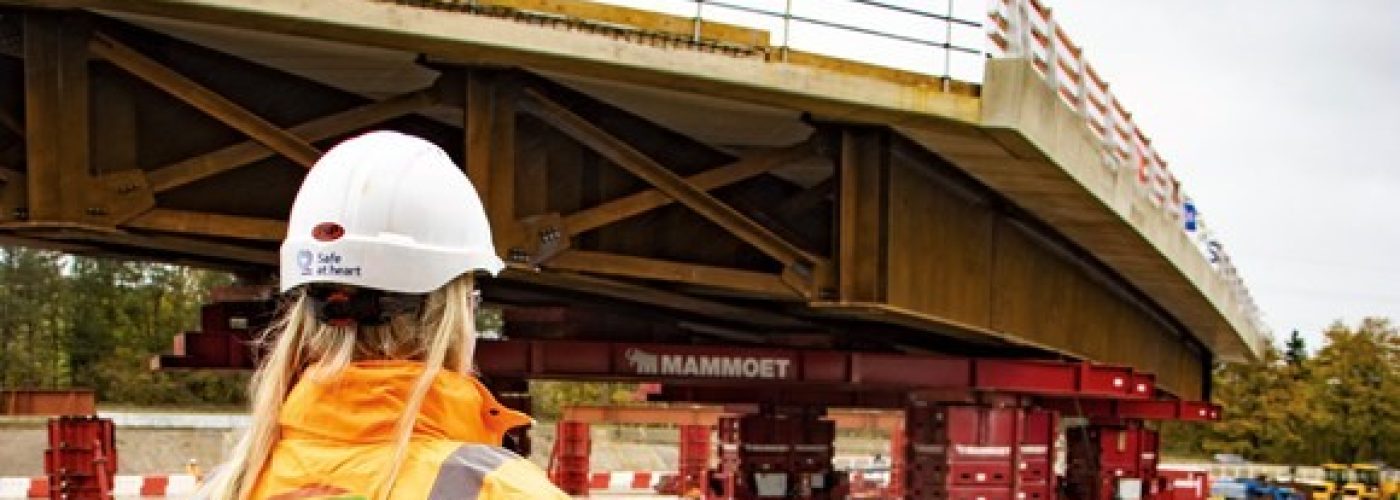- Major engineering milestone completed this weekend (24-25 October), as a 45 metre, 914 tonne modular bridge was driven into place over the A446 in Solihull.
- Designed in a virtual world, the bridge took only 45 minutes to be driven into place.
- The A446 has been reopened 24 hours earlier than planned.
- Durham-based Cleveland Bridge manufactured and supplied 220 tonnes of steel girders for the bridge, while Expanded’s off-site manufacturing factory in Nottinghamshire provided 80 precast concrete modular abutment blocks.
Video, time lapse and photos available here:
The second of four bridges to be completed on the site of HS2’s new Interchange Station at the heart of the new high-speed network, this new bridge will carry the A452 and form part of a major remodelling of the local road network. This will improve the circulation of traffic around the UK’s new high-speed railway, integrating the existing network with the new Interchange Station.
Prime Minister Boris Johnson visited the Midlands site in September to mark the official start of construction for the HS2 project, and a further two bridges are nearing completion. Over 200 people are involved in this construction site, contributing to supporting jobs in the region.
The bridge move was led by specialist engineering contractor Expanded and HS2 enabling works contractor, LMJV (Laing O’Rourke and J. Murphy & Sons Joint Venture). Also supporting the hi-tech process, a design joint venture involving WSP and Ramboll provided engineering and environmental services. By applying advanced digital capabilities to design all elements of the structure in a virtual world, they determined that the A446 road bridge would be built using a Design for Manufacture and Assembly (DfMA) strategy.
After building the bridge in modular sections, the final part of this process was the 128-wheel hydraulic platform taking just 45 minutes to move the bridge span 150 metres, where it was lowered onto the DfMA abutment shells to complete the overall bridge structure. Traditional construction methods would have required several weeks of lane closures on both carriageways, followed by additional weekend and overnight closures.
HS2’s Delivery Director David Bennett said:
“As work ramps up at one of HS2’s largest construction sites, it was fantastic to see this next milestone achieved so quickly. It was finished 24 hours ahead of schedule and follows hot on the heels of the installation of the bridge over the M42 in August, which was also completed early. We’re pleased to see innovations like this on the project dramatically reducing environmental impacts and disruption for road users.
“With construction of the railway now well underway, 22,000 jobs being created and an estimated 400,000 supply chain contracts available, HS2 is playing a pivotal role in helping Britain’s economic recovery.”
Jon England, DJV Project Director said:
“Our successful partnership approach has led to the design and construction of HS2’s first permanent bridges including one over the M42, the A452 bridge over the A446, as well as two other bridges over what will be the main HS2 railway line adjacent to the new HS2 Interchange Station.
“We are proud that through collaboration with LM JV, Highways England and local authorities, the application of 3D modelling techniques to align highways, earthworks, structures and utilities with the existing infrastructure and the innovative use of offsite manufacturing and Design for Manufacturing and Assembly techniques, we were able to safely deliver on this ground-breaking project.”
LM Senior Project Manager Richard Fairhurst said:
“Digital design, offsite manufacturing and modular components are the enablers of innovative construction methodology – they bring greater efficiency and safety to major infrastructure projects like this, and importantly, can save months on delivery schedules. That’s great news for clients, stakeholders and local communities alike. This is the future of bridge design and delivery.”





